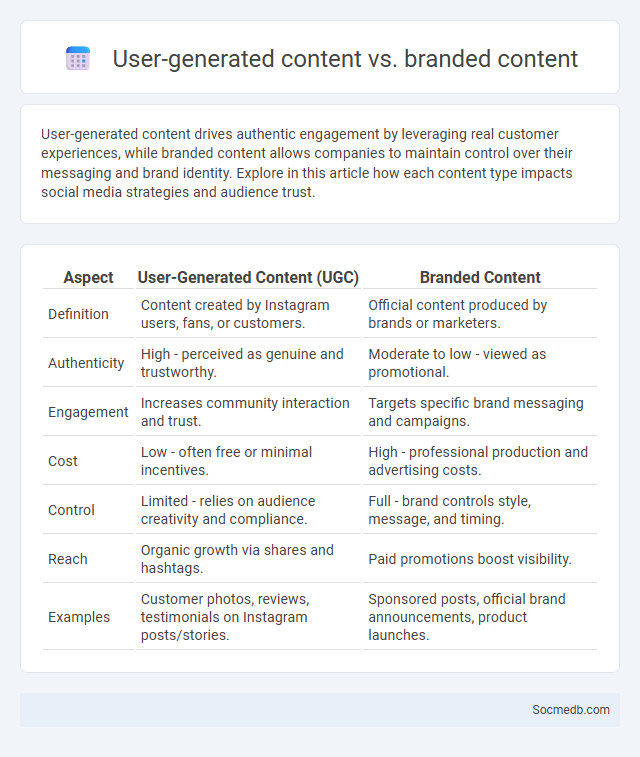
Photo illustration: User-generated content vs Branded content
User-generated content drives authentic engagement by leveraging real customer experiences, while branded content allows companies to maintain control over their messaging and brand identity. Explore in this article how each content type impacts social media strategies and audience trust.
Table of Comparison
| Aspect | User-Generated Content (UGC) | Branded Content |
|---|---|---|
| Definition | Content created by Instagram users, fans, or customers. | Official content produced by brands or marketers. |
| Authenticity | High - perceived as genuine and trustworthy. | Moderate to low - viewed as promotional. |
| Engagement | Increases community interaction and trust. | Targets specific brand messaging and campaigns. |
| Cost | Low - often free or minimal incentives. | High - professional production and advertising costs. |
| Control | Limited - relies on audience creativity and compliance. | Full - brand controls style, message, and timing. |
| Reach | Organic growth via shares and hashtags. | Paid promotions boost visibility. |
| Examples | Customer photos, reviews, testimonials on Instagram posts/stories. | Sponsored posts, official brand announcements, product launches. |
Understanding User-Generated Content
User-generated content (UGC) plays a crucial role in shaping social media dynamics by fostering authentic engagement and community building. Platforms like Instagram, TikTok, and YouTube rely heavily on user contributions to drive brand interaction and influence purchasing decisions. Analyzing UGC trends and sentiment enables marketers to harness consumer voices for targeted campaigns and enhanced brand loyalty.
The Essence of Branded Content
Branded content seamlessly integrates your message within engaging narratives that resonate deeply with target audiences, enhancing brand awareness and trust. By prioritizing storytelling over direct promotion, branded content drives higher engagement rates and fosters authentic connections across platforms like Instagram, TikTok, and YouTube. Your brand's ability to consistently deliver valuable, relevant content transforms passive viewers into loyal customers.
Defining Virality in Digital Marketing
Virality in digital marketing refers to content rapidly and widely shared across social media platforms, generating exponential reach and engagement. Key factors driving virality include emotional resonance, shareability, and relevance to target audiences, often amplified by influencers and algorithmic boosts. Measuring virality involves tracking metrics such as share count, engagement rate, and social reach to optimize campaign strategies effectively.
Key Differences: UGC vs Branded Content vs Viral Content
User-generated content (UGC) originates from customers or fans creating authentic posts about Your brand, whereas branded content is professionally produced by the company to promote its products or values. Viral content is characterized by rapid and widespread sharing that significantly boosts visibility but is unpredictable in nature. Understanding these key differences helps tailor social media strategies for engagement, credibility, and reach.
Advantages of User-Generated Content
User-generated content (UGC) significantly enhances brand authenticity by showcasing real customer experiences and fostering trust among potential buyers. High engagement rates arise as audiences are more likely to interact with relatable and genuine content created by their peers. Furthermore, UGC reduces marketing costs while increasing content diversity across social media platforms, driving organic reach and brand loyalty.
The Power of Branded Content in Brand Building
Branded content leverages social media platforms to create authentic connections between brands and their audiences, enhancing brand awareness and loyalty. By integrating storytelling with strategic visuals, brands can engage users emotionally, driving higher engagement rates and fostering community growth. Data shows that 70% of consumers prefer learning about products through content rather than traditional advertising, making branded content a powerful tool in brand building.
What Drives Content to Go Viral?
Content goes viral when it resonates emotionally with a large audience, encouraging shares, likes, and comments across platforms such as Facebook, Instagram, and Twitter. Algorithms prioritize content with high engagement rates, amplifying visibility through personalized feeds and trending topics. Influencers and timely relevance to current events also significantly boost the potential for widespread dissemination.
Case Studies: UGC, Branded, and Viral Campaigns
Case studies of social media campaigns reveal that User-Generated Content (UGC) significantly boosts engagement by fostering authentic connections with audiences. Branded campaigns strategically utilize targeted messaging and consistent visual identity to enhance brand recognition and drive conversions. Viral campaigns capitalize on trending topics and emotional appeal, rapidly amplifying reach and accelerating brand awareness, making your marketing efforts more impactful and measurable.
Integrating UGC and Branded Content for Viral Success
Integrating user-generated content (UGC) with branded content enhances authenticity and trust, driving higher engagement and viral potential on social media platforms. Your strategy should leverage UGC to create relatable narratives while maintaining brand consistency through curated branded elements, maximizing reach and impact. Combining these elements effectively boosts conversion rates and fosters a loyal community around your brand.
Best Practices for Maximizing Engagement and Reach
To maximize engagement and reach on social media, focus on creating high-quality, visually appealing content tailored to your target audience's interests and behaviors. Consistently use relevant hashtags, post during peak activity times, and engage with your followers by responding to comments and messages promptly. You should also leverage analytics tools to monitor performance and adjust strategies for continuous growth.
 socmedb.com
socmedb.com